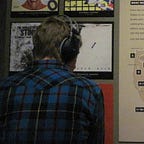Review: The Night House (2021)
Published at ThatShelf.com
Of late, the biggest scares in horror are to our ears, courtesy of loud musical “stings” that accompany something or someone jumping into frame. After a period of silence, stings then lance built-up tension so filmmakers can begin building toward the next jump scare. The practice trended with the Paranormal Activity franchise and gained popularity in James Wan’s Conjuring films. By the release of It: Chapter 2, however, the technique had gone stale. With every horror flick upping the ante, jump scares became pretty much meaningless. So it was a great pleasure when a jump scare in The Night House caught me by surprise. It was so disorienting, violent, and elongated that it stood out. After years of cueing jump scares upon arrival, The Night House provides no warning at all.
How The Night House treats its eponymous home is shorthand for how the film operates. This sleek home is exactly what you’d expect from a wealthy architect, but once the lights come down, everything takes on a nefarious sheen. Even the main character’s neighbors (Vondie Curtis-Hall) say her house is a different place at nightfall. The premise of a frightened woman alone in a house isn’t new, but that’s just director David Bruckner (The Ritual) messing with audience expectations. This film counts on audiences knowing the rules of the genre so that Bruckner can toy with them.
Beth (Rebecca Hall) just came home from her husband’s funeral to the house he designed just for her. No one knows why Owen (Evan Jonigkeit) paddled out to the middle of the picturesque lake that sits beside their dream home to shoot himself. Loss leads to curiosity, a theme explored in Personal Shopper and Don’t Look Now. Out of desperation to see loved ones again, the grieving dig into the supernatural, hoping to find something in the afterlife. Beth is a skeptic of life after death, but the house plays tricks on her at night. Strange visions and unnerving whispers lurk from dark corners of hallways, though it might be a cocktail of fear, grief, and paranoia that has Beth spooked.
The disembodied voice of Owen is one such example. He never speaks when he’s alive, leaving viewers to wonder: is the voice Beth hears his? Or is this another example of Beth losing all connection to her husband? Death is a constant presence in horror, yet the script explores death in a way that isn’t just a game of whether you’ll live or die. It’s more meditative. Beth is an atheist, and her husband’s suicide makes her wonder: will she see him again? Horror films rarely contemplate what happens after we die.
Questions haunt Beth as she sits at night, drinking her wine. We can never know those closest to us, and that gap only grows when a partner commits suicide. Beth was blindsided by the act because, as she explains to Claire (Sarah Goldberg), it should have been her. Beth already struggled with depression and mood swings, and the sudden loss of her husband has made her more dependent on alcohol. Each episode of night terrors making her behavior more erratic at work and social functions. The film doesn’t slog everything down in morbidity, as highlighted by Hall’s deadpan abilities. When a parent comes to contest a grade Beth gave her son, Beth initially resists, but when the mom keeps pressing, she explains that her husband just shot himself. If the mother wants a B, she can have a B because none of this really matters.
Rebecca Hall did the lone woman in a creepy house routine before (The Awakening), but Bruckner’s film asks a little more of the actress, and she delivers without fail. In a genre filled with cuddly widows, Hall avoids sanding down Beth’s edges. Beth isn’t the cowering widow, afraid that death will come for her next. No, she taunts the specters around her. Considering the creeping sound design terrifies most audiences, her courage — aided by alcohol or not — should be commended. Hall is reliably excellent in the smaller parts she occupies, Godzilla vs. Kong, The Gift, etc., yet with the spotlight firmly on her, she lets loose. Simultaneously vulnerable, raging, and morose, Beth is a well-deserved character showcase and a reminder that Hall should lead more projects.
The sound design steadily builds unease, waiting for the perfect time to grab viewers and shake them violently. If only the plot was as proficient as the sound and cinematography, The Night House would be a surefire 2021 top ten entry. A little of the supernatural can go a long way. Once the third act takes a hard right turn into the occult, it loses steam. The carefully threaded atmosphere of the first two acts gives way to a unsatisfying puzzle box. For some viewers, the difference between what they built in their heads and what the film eventually presents is disappointing. But as muddled as it gets, the third act isn’t a deal-breaker. With distinctive imagery, a solid lead performance from Hall, and a stream of non-stop scares, The Night House is the communal viewing experience that we’ve missed terribly.
